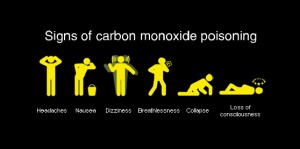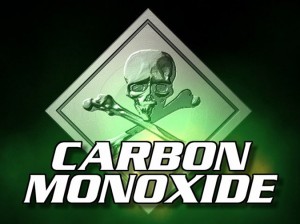 Being a trucker involves paying constant attention to all the things you see while on the road – traffic flow, road signs, changes in weather, other drivers shaving in their cars, cool-shaped clouds, etc. But what about the things you can’t see? They can be just as important. You may have seen in the news, “California couple files suit in carbon monoxide poisoning,” or, “Police suspect carbon monoxide poisoning in trucker death.” They didn’t see it coming. Don’t let this happen to you. This article will tell you what you need to know about this silent killer, how to recognize the symptoms of carbon monoxide poisoning, and how to avoid it.
Being a trucker involves paying constant attention to all the things you see while on the road – traffic flow, road signs, changes in weather, other drivers shaving in their cars, cool-shaped clouds, etc. But what about the things you can’t see? They can be just as important. You may have seen in the news, “California couple files suit in carbon monoxide poisoning,” or, “Police suspect carbon monoxide poisoning in trucker death.” They didn’t see it coming. Don’t let this happen to you. This article will tell you what you need to know about this silent killer, how to recognize the symptoms of carbon monoxide poisoning, and how to avoid it.
What is carbon monoxide and why is it a problem? Carbon monoxide (CO) is the product of burning fossil fuels. Cars and trucks run on fossil fuels like gasoline and diesel. Heaters are powered by fossil fuels like oil, propane and kerosene. Cigarette smoking is also a source of CO exposure. A person can be poisoned in their home as well as in their vehicle by CO. Normally, oxygen hooks on to the hemoglobin in our red blood cells and travels around to our tissues to nourish them – without oxygen we die. But, carbon monoxide really loves hemoglobin – even more than oxygen does! When CO is floating around in our blood, it gets to the red blood cell first and doesn’t allow the oxygen to latch on. We are starved for oxygen. Carbon monoxide poisoning is the number one cause of poisoning deaths in the United States. 10-40% of people who suffer long-term exposures to CO can have nervous system disorders as a result.
The biggest problem with carbon monoxide is that you can’t smell it, taste it or see it, and it doesn’t irritate your eyes or skin. So, you have to know what to look for that might lead you to think about CO poisoning. According to the Centers for Disease Control and Prevention (CDC), the most common symptoms of CO poisoning are headache, dizziness, weakness, fatigue, nausea, vomiting, chest pain, and confusion. High levels of CO you breathe in can cause loss of consciousness, coma and death. You could have a small to moderate amount of CO in your blood that would only cause mild symptoms. The more there is, the more dangerous the situation becomes because your brain is not getting enough oxygen. CO poisoning can be difficult to diagnose because the symptoms can be the same as with other illnesses. People who are sleeping or intoxicated can die from CO poisoning before ever experiencing symptoms. If you are having symptoms for a long time, brain damage that cannot be repaired may be occurring.
 How does carbon monoxide get to you? You know that news headline above about the trucker who died? It seems he was just trying to stay warm in his truck by using a propane heater. When there isn’t any way for the CO to escape the area, it builds up in our environment and slowly (or not so slowly) can poison us. If the exhaust system in your truck is not properly vented, the CO can build up in the cab causing you to feel symptoms. This can happen over a long period of time or very suddenly. This can be true at home, as well. If you see your family members and pets looking fatigued, drowsy and/or slow, there might be a problem with your furnace or a gas leak.
How does carbon monoxide get to you? You know that news headline above about the trucker who died? It seems he was just trying to stay warm in his truck by using a propane heater. When there isn’t any way for the CO to escape the area, it builds up in our environment and slowly (or not so slowly) can poison us. If the exhaust system in your truck is not properly vented, the CO can build up in the cab causing you to feel symptoms. This can happen over a long period of time or very suddenly. This can be true at home, as well. If you see your family members and pets looking fatigued, drowsy and/or slow, there might be a problem with your furnace or a gas leak.
What can you do to prevent carbon monoxide poisoning? First and foremost, make sure that your truck’s exhaust system is in proper working order. You know that headline above about the California couple who sued because of CO poisoning? Their claim was that they asked their employer to fix the exhaust system in their truck and it was never done. Do whatever it takes to make sure you are not being exposed over the long haul – and don’t ever use a space heater in the cab of your truck. There are detectors you can buy to measure the levels of CO in the environment. Get one for your truck and as many as you need for all of the bedrooms at home. A detector that is sensing high levels of carbon monoxide will alert you of a situation that needs to be remedied before it’s too late.
What should you do if you are experiencing these symptoms? Open your windows! You have to get rid of the contaminated air immediately. If your symptoms are severe, call 911 or the appropriate emergency service number in your area. Make sure to tell the health care provider taking care of you that you are a trucker and give him/her a rough idea of how much time you spend in your truck. This is a very important piece of your history that could lead to an early diagnosis of CO poisoning and not waste valuable time. If you realize you are having some of these symptoms frequently but you are not seriously ill, go to your health care provider and tell her/him of your concerns. Mention that you are concerned about CO poisoning, because this is not the first thing that will pop into their mind and it could be an important diagnosis that gets missed unless you say something about it. A blood test will reveal if you have abnormally high levels of CO. For sudden, acute CO poisoning, pure oxygen is the treatment.
Long-term exposures to carbon monoxide present the greatest risk to persons with coronary heart disease and in females who are pregnant. Take stock now to determine whether or not you might be at risk for carbon monoxide poisoning and prevent it! It’s a silent killer – don’t let it take you down!! I would like to send out a special “thank you” to Kevin M. Xuereb, RN, CCRN for this great idea for an article. If we can help or save just one trucker suffering from CO poisoning out there, it is all worth it.

2 Comments
Hello, Dr. Hannigan! You provided the most eloquent explanation and practical application about carbon monoxide that I have ever read! I have been bragging to my friends that I have such a wonderful colleague as you. You make me proud to be a nurse practitioner. Have a lovely spring! Joy
Hello Dr. Hannigan
I believe my husband died from CO exposure in the cab of is truck , OSHA and DOT have both refused to investigate. His employer insists his death is not work related. It think we are loosing numerous drivers to CO and it is to easy to slap Cardiac Arrest or Ischemic Heart Attack or Myocardial Infarction on a death certificate. All of these can be caused by various levels of Carbon Monoxide exposure. My husbands test were not done about 180 days post mortem and they only managed to test liver tissue. It was two days before he was found, his truck had been idling , and the heater running. His company has denied me his life insurance and work comp . Long story . I have been looking for anyone that could possibly help me. I am not a rich woman but I know deep in my gut this is what really happened to him. I have started a carbon monoxide awareness page because I do not want this to happen to any other family . Could you possibly help or know someone who could?